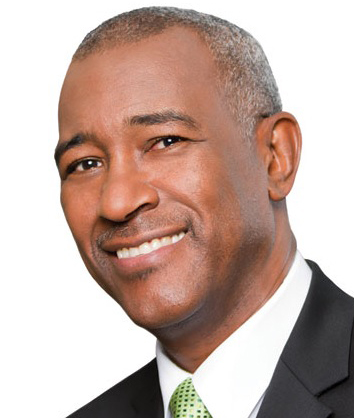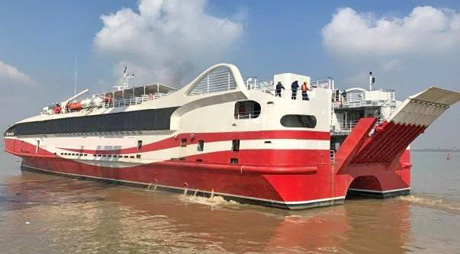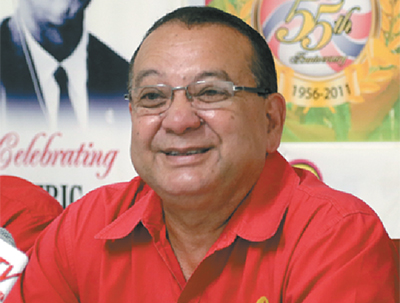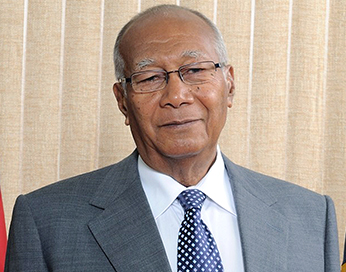Trinidad & Tobago
No Petrotrin retrenchment, privatisation

Port-of-Spain – The government has taken no decision to retrench 2,000 Petrotrin workers by the end of next month, and furthermore, no decision has been taken to privatise the State-owned oil company, Energy Minister Franklin Khan said last week.
At the time he was categorically denying “malicious rumours” that the government planned to send home 2,000 Petrotrin employees, and it had agreed to divest Petrotrin with 65 percent of the shareholding going to ANSA McAL, 25 percent to the Massy Group, with the government retaining a minority shareholding of ten percent.
Said Khan: “I want to go on record debunking that rumour, and to even go so far to say it is a malicious rumour which is intended to influence government policy and thinking on Petrotrin.”
He added: “No decision has been taken to retrench workers, especially this whole thing about 2,000 by February; and absolutely no decision has been taken to privatise Petrotrin, especially in the quantum being reported. That is total mischief. We have been very open and transparent in dealing with Petrotrin. We have brought the population up to speed on the challenges Petrotrin faces.”
Khan said it was no secret Petrotrin faced serious and almost insurmountable challenges, including a debt of almost (TT) $15 billion, with a bullet payment of $850 million due in 2019.
He said Petrotrin had no working capital and was generating an operating loss. Its working capital was being underwritten by the Ministry of Finance so the company could continue to feed its refinery. He said the operating cost had sky-rocketed and the company was poorly structured.
Khan said the Lashley report recommended the company be restructured into three business units – one for refining and marketing; another for exploration and production (land); and one for Trinmar.
“It is the view of this administration that once done properly, Petrotrin has the resource base and the asset base to become a viable entity, but it calls for serious work, serious restructuring and serious re-definition of the business processes at Petrotrin,” he said.
Khan added: “Petrotrin needs strong leadership, a new human resource skillset, strong management at the technical level. It needs technology and significant capital injection into the company.”
He also noted the new board is working assiduously to come up with solutions, and was consulting with all the major stakeholders – Oilfields Workers' Trade Union, workers, contractors and the communities that are impacted by Petrotrin.
“We are well aware that Petrotrin impacts the survival of significant communities in Trinidad. The town of Marabella, the town of Pointe-a-Pierre are fed largely from the refinery, the entire south-western peninsula, all the villages from Siparia, Santa Flora, to Erin, to Fyzabad, to Forest Reserve, to Point Fortin, all depend on Petrotrin's existence for their very existence. The government is quite sensitive on the impact that Petrotrin has on various communities in South so we will not be making decision willy-nilly. But having said that the government is well on its way to coming up with the proper plan for Petrotrin, and that plan will be rolled out to the stakeholders and the national community in the shortest order,” he said.

At the time he was responding to a question from Opposition Senator Taharqa Obika on the Order Paper at the Senate sitting.
“The authority has over $600 million worth of money that is outstanding. The authority is in a dire financial position and I also want to make the point that water in Trinidad and Tobago is probably the cheapest in the world,” said Le Hunte.
Obika asked the minister if this means that WASA will be increasing water rates. Le Hunte said this falls under the purview of the Regulated Industries Commission, which is currently conducting a review of the water rates.
Le Hunte said WASA has several options for delinquent customers to settle their bills, but if this is to no avail then WASA has the right to sell properties to get the money owed.
“We are encouraging all individuals to set up payment plans and deal with their arrears and we will be embarking as a last resort on the attempt to sell people's property on a case-by-case basis. Where people fail to avail of situations or seek assistance or seek to come to the authority to deal with their matters, the authority will exercise their rights to recover the large sums of money that are outstanding,” said Le Hunte.
He said the law does not specify the level of indebtedness and WASA will therefore follow the process for the recovery of outstanding rates. He said where there has been no success, the authority will determine whether to pursue the sale of the property on a case-by-case basis.
He said persons who are infirm or disabled will receive consideration in how WASA exercises the power of sale.
Le Hunte said people who face challenges with the payment of their water bills are reminded there are mechanisms in place to provide assistance to qualifying individuals. The ministry through its utilities assistance programme, provides assistance with the payment of utility bills to low-income persons such as pensioners, persons with disabilities and the beneficiaries of public assistance and the conditional cash transfer programme food card.
In addition WASA offers a payment plan to its customers who have fallen in arrears with water rates.

The new ferry, named Galleons Passage, is a catamaran and will arrive in Trinidad and Tobago in April, “Once all goes well”, Finance Minister Colm Imbert said last week. The vessel is named after the sea channel between Trinidad and Tobago. It is 74-metres long, slightly smaller than the other fast ferries which are 94 metres long now in operation between Tobago and Trinidad. The other faster ferries carry 900 passengers and about 180 cars. The Galleons Passage carries 700 passengers and 100 cars. Imbert said the new ferry would be able to make the Tobago trip in four hours. The current average time for the T&T Spirit and the T&T Express is four hours 15 minutes.

This price excludes the (US) $800,000 to ship the vessel from China, the 10,000 pounds Sterling in legal fees, and the airfare, accommodation, and “small stipend” paid for University of Trinidad and Tobago experts to inspect the vessel, Imbert said.
Following this sudden announcement, the government came under criticism for the purchase, among the critics the chairman of the Tobago Hotel and Tourism Association Chris James, who said there should have been consultation before such an important purchase was made. Also weighing in with criticism was former Transport Minister Devant Maharaj, who argued proper procurement procedures were not followed.
However, Khan maintained the government was presented with an opportunity to get a much-needed ferry at an affordable price, and could not take the risk of delaying or publicising the move.
“Remember, you are chasing a deal that if it is made public knowledge, somebody could have gone and stymied the deal. Obviously, somebody could have gone and offered more and then come to want to lease back the boat to Trinidad and Tobago,” he said. The vessel was a bargain for the country, he declared.
“To acquire a new vessel of that size and of that capacity for a mere $17 million US dollars was a steal of a deal,” Khan maintained.
“Luck played its part with us because we just happened to have a vessel that was built for another client, who because of financial issues, could not take the vessel. So, we had a unique opportunity to purchase the vessel at a significantly reduced cost. All the testing and all the due diligence was properly done. Based on the circumstances that led to the purchase of the boat, we know what the specifications of the boat were. You cannot be in an international maritime market, which is a cut-throat business, and you have your international brokers looking for a deal for you, find one that is so beneficial that it is almost unbelievable, and then make that public,” Khan said.
He added certain people were questioning how a boat at such a price could be of good quality. Instead, these critics should thank God it was so cheap, he said.
Khan said Tobagonians seem to be very pleased with the purchase and other critics would be too, once the ferry arrives in Trinidad and Tobago.
“When the boat comes and they see it and they ride on it, I think they will be very happy,” he said.
However, James maintained there had been no consultation with Tobago stakeholders on the purchase. While he could not give an assessment of the vessel because of insufficient information, from what he had received he understood the new ferry to be slower, and with less capacity than previous vessels. There ought to have been consultations before such an important purchase was made, he maintained.
Chairman of the Dr Eric Williams Memorial Committee Reginald Vidale was also critical of the unilateral decision to purchase the ferry. While he understood the urgency, he believed a national conversation should have taken place.
“I think that going ahead and purchasing the ferry in the absence of consultations is a gross disrespect which should not be tolerated under (any) circumstance,” Vidale said.
He also criticised the government's decision to name the ferry Galleons Passage, a decision which was also made without consultation.
“Naming the ferry should be done in consultation with the people of the Republic of Trinidad and Tobago, and not just a few, or possibly one person,” Vidale stated.

Most nationals recalled Richards during Carnival.
“He was a good president,” said Rosana Munroe, leader of the 29th Port of Spain Cub Scouts from Belmont Government Primary School attending the funeral service.
Euric Hutchinson held on to his funeral programme, which he said he will treasure, while Robert Pyle reminisced on a Carnival time when Richards left the Grand Stand at the Queen's Park Savannah in Port of Spain and was heading to President's House in St Ann's. At the same time, a band from Belmont was heading to the Savannah and, “Max stopped his entourage, exited, and joined the jolly bunch. He enjoyed himself to the max.”
Finbar Clarence was said did not make it in time to sign the condolence book, but will always retain the memory about “The first time I saw a president play mas and jump up with people”.
Among the dignitaries at the funeral service was Chief Justice Ivor Archie, who later sang the Lord's Prayer and the Hallelujah Chorus in the choir with the Lydians.
Also among the mourners were acting President Christine Kangaloo, Prime Minister Dr Keith Rowley and his wife, Sharon Rowley, Opposition Leader Kamla Persad-Bissessar and other Opposition MPs. There were also St Augustine campus principal Prof Brian Copeland; former prime minister Basdeo Panday and his daughter Mickela; and former education minister Hazel Manning, wife of the late prime minister Patrick Manning. Anglican Bishop Rev Claude Berkley officiated.
and told to return
Last week Health Minister Terrence Deyalsingh confirmed the cancer drugs had arrived in the country “around Christmas time”, and while he did not say what the hold-up was, a pharmacist at the St James Medical Complex blamed slow work at the port for the delay.
At this time there is a shortage of Gleevec, manufactured by Novartis and used to treat leukemia. Though several patients have been turned away from Mount Hope, Deyalsingh said the drugs are in the country.
“I know for a fact Gleevec came in as promised. I had a meeting with Nipdec (last week) and they have received the drugs,” Deyalsingh said.
Deyalsingh denied people were being turned away from Mount Hope, even as two patients confirmed to the media being told to come back by the hospital.
Said Deyalsingh: “No one is being turned away. They are being rebooked for seven days whilst the shipment is being cleared.”
However, some patients have said seven days is too long.
“I've been coming here for a while and there were three or four people on the same medicine cycle with me, I am not seeing them again and I am starting to wonder what happened to them,” one woman said.
She described coming to Mt Hope for cancer treatment and medicine collection as “Always a hassle”.
Another woman with leukemia said last month she had the same “Run around” to get the Gleevec pills.
“I was here last month and was told that while the drugs was on the shelf and in the system, they could not give it to me because it was expired,” she said.
The Communications department at the North Central Regional Health Authority denied that there were expired drugs in the country.
“Gleevec is a controlled cancer drug that is frequently used at the EWMSC. We were never out of this drug in 2017 and we had one prescription request for the drug in December. This prescription was filled,” the department said.
